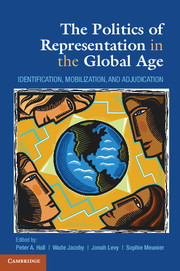Book contents
- Frontmatter
- Dedication
- Contents
- Abbreviations
- Acknowledgments
- Foreword
- 1 Introduction
- Part I The Politics of Interest Representation
- Part II Responding to the Challenges of a Global Era
- Part III New Institutional Settings for Representation
- 7 Blurring Political and Functional Representation
- 8 Altering Politics
- 9 Private Regulation (and Its Limitations) in the Global Economy
- Short Biographies of Editors and Contributors
- Index
- References
8 - Altering Politics
International Courts and the Construction of International and Domestic Politics
Published online by Cambridge University Press: 05 June 2014
- Frontmatter
- Dedication
- Contents
- Abbreviations
- Acknowledgments
- Foreword
- 1 Introduction
- Part I The Politics of Interest Representation
- Part II Responding to the Challenges of a Global Era
- Part III New Institutional Settings for Representation
- 7 Blurring Political and Functional Representation
- 8 Altering Politics
- 9 Private Regulation (and Its Limitations) in the Global Economy
- Short Biographies of Editors and Contributors
- Index
- References
Summary
There has been a paradigmatic change in number, design, usage, and political influence of international courts since the Berlin Wall fell in 1989. Before the Cold War ended, international courts (ICs) were primarily voluntary dispute settlement bodies, available should governments desire a legalized solution to a transborder disagreement. These “old style” international courts were pretty much unable to meaningfully alter domestic and international politics, because governments would block inconvenient cases from proceeding. The exception to this rule of ICs with voluntary or revocable jurisdiction was the European Union's Court of Justice (ECJ). Already in the 1980s we could see litigants using the European community's legal system to challenge domestic policies with which they disagreed. Women in Britain demanded greater pay equity and challenged a tolerated practice of dismissing pregnant women. Student groups in Ireland demanded the right to publish a “how to” guide to go to the United Kingdom to get an abortion. More recently, Lithuanian firms challenged the tactics Swedish unions used to shut down construction projects staffed by lower paid Lithuanian workers.
In the 1980s, the European Court of Justice was seen as a strange international court. It had nonrevocable compulsory jurisdiction, a commission that could raise infringement suits against states, and preliminary ruling mechanism that allowed private litigant complaints to reach the European court. Today, there are more than two dozen permanent international judicial bodies. Most of these courts resemble supranational European legal models. Eighty-eight percent of operational ICs (twenty-one of the twenty-four permanent ICs) have a broad compulsory jurisdiction and twenty-one out of twenty-four authorize nonstate actors – supranational commissions, prosecutors, and/or private actors – to initiate litigation. Compulsory jurisdiction means that defendant states cannot block litigation from proceeding, and wider access potentially allows issues that concern peoples rather than states to be adjudicated. A final difference is that increasingly delegation to ICs is coupled with embedding international law into national legal orders. Treaty ratification has always involved making the international treaty part of domestic law. But the European legal model combines embedded supranational law with international legal oversight of how this law is interpreted and applied domestically. Private litigants or international commissions can trigger this oversight, pursuing cases that states might avoid raising, and framing legal challenges boldly to evoke rulings with precedential value.
- Type
- Chapter
- Information
- The Politics of Representation in the Global AgeIdentification, Mobilization, and Adjudication, pp. 176 - 199Publisher: Cambridge University PressPrint publication year: 2014



